Cover Story
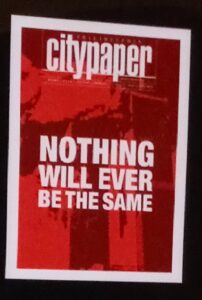
Observations and ruminations on the day the world changed, from Philly, New York and Washington.
By Howard Altman, Jim Barry, Daniel Brook, Jenn Carbin, Daryl Gale, Mary F. Patel, Gwen Shaffer, Rick Valenzuela and David Warner
Tuesday, September 11, 2001
9:45 a.m., U.S. Customs House, Second and Chestnut
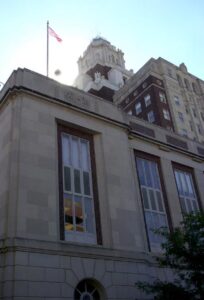
Elva Cherry is standing on the stone steps of the Customs building, trembling.
“I am really concerned,” says Cherry, a technician with the Food and Drug Administration.
She has good reason.
She works in a federal building, which in this chaotic hour may or may not be a target. No one really knows.
“There’s been no word,” she says, about any plans to evacuate the building. “I was crying when I heard the news.”
9:52 a.m., Independence Hall
National Park Service rangers move nervously around the national monument, ushering visitors in and out of the historic building. None want to talk, referring comment to National Park Service spokesman Phil Sheridan.
10 a.m., Northwest Philadelphia
A friend in the police department calls. “Are you watching this on TV? It’s unbelievable. We should bomb Mecca!” When asked about his schedule, the cop replies: “We’re going to a 12-hour shift. We’ve gotten an alert to stop anyone who looks suspicious. Search any packages. It’s going to get crazy around here.”
10:05 a.m.
“The bomb squad is on alert, everything here is like Defcon 8,” says police bomb squad officer Jack Keen via cell phone. “I really can’t tell you whether there are any plans to shut down Independence Hall. That’s up to the Park Service. But we are on the roll.”
10:16 a.m., Liberty Bell pavilion
Helen Hamilton of Ocean City, N.J., has just left the Liberty Bell, which she is visiting with her friend Charlotte Jones and Jones’ 8-year-old son Brandon.
“I was very scared that the buildings were attacked by planes,” says Brandon Jones, shaken and somewhat unnerved by the radio microphone stuck in his face.
Hamilton and the Joneses were on “an educational trip,” says Charlotte Jones, and decided to visit the Liberty Bell even though they heard, on the radio, that the World Trade Center had been attacked.
“This is a symbol of our independence,” Brandon Jones says, with some prompting from a radio reporter.
Minutes later, Scott Mindlin and his father Herb are walking across Liberty Mall from Pennsylvania Hospital, where Herb Mindlin had just undergone cataract surgery.
“Oh my God,” says Scott Mindlin, who is only now learning what happened in New York and D.C. “This is the scariest thing I have heard in my life.”
Lee Shau Ming is the last visitor to leave the Liberty Bell before it’s closed by the National Park Service at about 10:30.
“I don’t really know what is going on,” says Ming, who is visiting from Beijing. “But they told us there was some disaster in New York, and they want us out of here.”
As Park Service rangers scurry to lock up the Liberty Bell, Ming is calm.
“I am not concerned,” says Ming.
Charlotte Jones’ cell phone rings.
“Helen, we have to get out of here,” she shouts out to her friend after a brief telephone conversation. “We are going to war.”
11 a.m., City Hall
Mayor John Street conducts a press conference in Room 202. Street condemns the terrorist strikes as “cowardly, shameful acts” and announces the city’s own emergency plan: All government buildings, airports, schools, libraries and museums will shut down at noon. All police, fire and rescue personnel will be called from home and vacation and put into the work rotation. Local national parks and monuments will be shut down until further notice.

11 a.m., Hoboken, N.J.
Kathleen Kenny is standing on Willow Avenue, where she lives. She should be at work. She was originally set to go into Keefe, Bruyette & Woods, an investment-banking firm on two high floors of the World Trade Center’s south tower, early today. But she says she “started a little late,” and that shortly after 9 a.m., while still at home, she received “an unusual call from a friend asking me what tower I worked in.”
Kenny says she called work and spoke to an executive assistant who had watched a plane tear through the Trade Center’s north tower minutes before and was just then watching bodies fall out of floors facing her window on the south tower’s 89th floor. The assistant continued to answer phones. “She had 18 minutes to get out of there” before the south tower was attacked, Kenny notes. Kenny doesn’t know if the woman is alive.
Kenny attempted to connect with a colleague, but was told that she left shortly after the first hit. “Lightning doesn’t strike twice,” Kenny says, referring to the bombing of the World Trade Center in 1993. “She didn’t think it was an accident.”
Kenny says that her own first reaction was that it was indeed an accident. A few hours later, she now knows that both towers have been reduced to rubble and that three major acts of terrorism have been committed on American soil.
She is simultaneously lost and busy: She doesn’t know what happened to her 210 fellow employees — she spoke with her boss, who was off-site — yet she is fielding calls that are “pouring in from [friends] around the world.” And she is trying to reach her husband, who is stranded on the island of Manhattan. “My world as I know it is over,” she says.
“I can hear the Air Force flying above me; there is a steady stream of traffic — going where, I don’t know; roofs are filled with people. I heard that they’re clearing off the water so they can bring [some of the injured to New Jersey].” Kenny has just been on a rooftop herself, watching one of the towers collapse on itself. Now, “it is eerily quiet, very calm,” she says, sounding increasingly remote herself.
Like her, the people Kenny spoke to early this morning thought a plane crashing into the north tower was a terrible accident; they didn’t make the leap to it being an intentional event until they were forced to, with the second hit. This despite working inside the architectural symbol for American economic strength and global power. If you consider that many of these people, including Kenny, worked at the twin towers in 1993, when a bomb killed six people and wounded many more, you marvel at the faith we humans place in each other. Or is it our capacity for denial? It might just be both the usual commotion and surreal nature of working in the Trade Center. Kenny says “helicopters are constantly buzzing around” the towers and that it wasn’t ridiculous to think something had gone awry with an aircraft.
Kenny is thinking now of all the people affected by this, on a lovely day in late summer, no less. “Fifty-five thousand people work [in the towers], 200,000 make their way through here during their commutes; there are bike messengers, food-delivery people. There would be tourists lined up downstairs — it’s a beautiful day…” Kenny cups her hand over the phone and calls to neighbors “in business suits with briefcases” who have just disembarked from a ferry from New York City. She seems relieved to see this familiar activity, and their familiar faces, even if at an odd time of day. Everything else is upside down. Still, the forced solidarity is weird. Surveying her world at the moment, she muses, “This is surreal. The landscape of America has changed — the World Trade Center is gone.” She asks the reporter to contact her husband and let him know that she’s okay. Like everyone else in the North Atlantic, she’s having trouble getting a call out. But her phone trouble might be less connected to busy lines. “Our long-distance service comes off the tower of the World Trade Center,” she says without irony.
11:30 a.m., Center City
Bewildered tourists, unable to visit the Liberty Bell and Independence Hall, wander aimlessly, jostling with the office workers who are scrambling to get home early. Some see the early workday as a reprieve, but most are frightened and confused. Most cell phones have spotty reception, and people are frantically trying to call loved ones.
“If it can happen in New York, it can happen here,” says one woman, nervously smoking a cigarette as she waits for a bus on Market Street. She refuses to give her name for publication, as does her companion, a healthy dose of paranoia added to the mix of emotions.
“There’s only one major city between New York and Washington, and it ain’t Baltimore,” the second woman pipes up. “And we have lots of national symbols here.”
Both women say their most pressing concern at the moment is getting home to their children.
12:30 p.m., Fifth and Market
A crowd gathers on the patio outside KYW’s studio. Tourists, passersby and curious onlookers huddle around a 13-inch television to watch Dan Rather recount the horrors in New York and Washington. Some weep openly, others shake their heads and vow revenge against the bastards responsible for the carnage.
Ten minutes later, Police Commissioner John Timoney conducts an impromptu press conference in front of the Liberty Bell for a half-dozen reporters.
“One thing I guarantee is that policing in this country is changed forever,” says Timoney, “in more ways than I can count here. We have to change the way we look at internal and external security from now on.”
Timoney notes that already there has been a huge increase in the number of 911 calls, some by genuinely concerned citizens, some by sick pranksters.
“It’s sad, but a thing like this always brings the cranks and hoaxers out of the woodwork,” he laments. According to Timoney, extra 911 operators have also been pressed into service, and every available police unit is out on the street.
1 p.m., Starbucks on Germantown Avenue, Chestnut Hill
A lone customer, an old man, sips coffee at a table. Three employees are huddled behind the counter listening to the radio — disaster in mono.
The manager announces that she’s closing the shop early and posts a sign on the door that reads, “Closed due to the emergency.” She’s been crying. When asked why she is closing early, she says, “Some of my [employees] have friends who work in the World Trade [Center]. They don’t know if their friends are dead or alive. Nobody wants to work tonight, so I’m closing up.”
1:30 p.m., Acme on Ridge Avenue, Roxborough
A shopper and cashier are talking. “It looks like a snow day in here,” the shopper observes. “Everybody’s clogging the aisles to buy canned goods. They’re stocking up on supplies of food.”
The cashier says, “I’ve been asking every customer the same thing today. I say, ‘What are you thinking about?’ And do you know what they say? They all say the same thing. They say, ‘I wonder if I should go to the bank and get my money out. Do you think I should?’ That’s what they ask me, do I think they should. I think they should be going to church or going home to hug their loved ones, honey. I think they should thank God they’re alive.”
The shopper asks the cashier what she is thinking about.
“I’m thinking about my brother,” she says, after a pause. “He works in the World Trade [Center]. My mom has been calling his house all morning. We haven’t heard from him yet. I’m just praying he’s safe, that’s all.”
2 p.m., Center City
It looks more like Sunday evening than a weekday afternoon. Cars are scarce, businesses are shuttered and the restaurants that remain open are nearly empty. Three policemen stand at the entrance to the federal courthouse on Market Street, drinking coffee and talking about terrorism here and abroad.
“This is just unreal,” says one officer. “They basically shut down the city for the day. That’s fine, but what are we going to do tomorrow?”
2:02 p.m.
A report coming over the police scanner indicates that officers are investigating a suspicious car parked at a reservoir.
About half-hour later: “All police are on the highest state of alert,” says an unidentified officer over the police radio. “Police are paying particularly close attention to all federal and state facilities. Bomb threats or suspicious activities will be reported to police radio.”
Minutes later: “Water treatment plant, all clear, Medic 254.”
3 p.m., Old City
The streets are nearly deserted. Rows of empty SEPTA buses that were packed with commuters earlier in the day now sit idle along Fifth and Market streets. Drivers congregate on the corner, discussing the day’s tragic events. All around them, Independence Mall is cordoned off with yellow police tape. White sandwich boards unnecessarily announce that the park is “closed to the public.”
Outside of KYW news studios at the corner of Fifth and Market, two televisions broadcast the latest events. About a dozen students, mostly in their late teens, are camped out in front of the televisions. A few of them divide their attention between the newscast and hot-off-the-press special ed-itions of the Inquirer.
“I bet Al Gore is sitting back in his easy chair right now, thinking, ‘Thank God I didn’t get elected,’” one kid wearing a yarmulke comments to his friends as they emerge from the stairwell leading to the street from the El.
A van pulls up alongside the KYW building and several men wearing white aprons over T-shirts hop out. One guy hoists a gigantic plastic bowl of potato salad out of the van and carries it inside. Meanwhile, his colleague unloads one case of Pepsi after another. They make numerous trips inside the building, carrying in duffel bags full of sandwiches, containers of pasta salad and trays of cookies.
While most city offices have closed for the day, it is going to be a long night for journalists.
4 p.m., Old City
Two police cars have blocked off Sixth Street from Arch to Market, where the federal courthouse and its offices are located. The construction site across the street, future home of the Constitution Center, is deserted. The whole area is nearly silent. Six additional patrol cars are parked between Spring Garden and Arch Street, by Franklin Square park, where Chinese people practice tai chi every morning.
A lone bicyclist with a backpack stands in the park shooting the breeze with the cops. Suddenly there is a loud noise — crack! — and everyone freezes. It takes a second for everyone to realize it’s just a car backfiring as it heads over the bridge to Jersey.
4 p.m., Casper’s Place, 3510 Cottman Ave., Northeast Philadelphia
Happy hour has begun early today. “[T]hey started coming in about noon,” says Joanne, the bartender.
All eyes are on the five televisions replaying the horrific incidents. Joanne says she is worried about reprisals in the city against any Arab-Americans and Americans who are Muslim.
George Wesner, nursing his mug at the bar, agrees with Joanne about repercussions. “This is like Pearl Harbor,” he says. “I hope they don’t blame the Muslims here like they did the Japanese-Americans. They took all the Japanese here to [internment] camps. I saw the foundations where they kept them.”
Wesner and his friend John Carney (this reporter’s father) are concerned about their friend Eihab El-Azazy, an Egyptian Muslim. He came here six years ago and was a boarder in Carney’s house until he became a citizen. He now teaches English in public school and lives with his Muslim wife in Mayfair.
“I know practicing Islamic people who are extremely honest and are now embarrassed,” Carney says.
Late afternoon, New York
Peter Clowney, former WHYY-FM arts reporter, works at National Public Radio-outlet WNYC now, where he’s editor of Studio 360, the Kurt Andersen-hosted arts and culture show. He commutes from East Mount Airy to offices in the Municipal Building, just a few blocks away from the World Trade Center.
His ride on the PATH train from Newark, N.J., to the TradeCenter usually takes about 25 minutes. This morning, a conductor stopped the train at the Grove Street stop (still in Jersey) and announced through a walkie-talkie, “This train doesn’t go any farther!” He said it was being redirected to 33rd Street in Midtown Manhattan, without saying why.
Waiting on the platform, Clowney and his fellow commuters got their first hint of what had happened: A well-dressed, distraught woman was standing there, trembling, screaming, “I saw it! I saw it!” People asked her what she’d seen. “I saw the plane, the plane!” She described having seen a plane hit one of the towers — “It was the most horrible thing I’ve ever seen!” — but said the tower was still standing.
The commuters boarded a new train headed to 33rd. During that ride an announcement came over the PA system saying (surprisingly, considering the circumstances) that people headed downtown could transfer to a different subway line.
So that’s what Clowney did. That train, too, was discontinued, though, and he transferred to another, where riders heard even more harrowing news, again from a woman who had witnessed the disaster: “I saw the second plane!” she told them.
“That’s the moment we all knew it was terrorists.”
Clowney continued on the train to the City Hall stop, directly under the Municipal Building. Coming up into the building’s great vaulted courtyard, he could see “black smoke and clouds everywhere outside.” Stepping to the right just a bit, he could see the towers on fire.
He was about to try to get into his office building when a cop started shouting to the crowds, “You’ve gotta walk uptown!”
He began to walk north; cops were directing people with admirable calm. Then he heard a boom behind him: the explosion of the first tower collapsing. It was then, when people started to run, that he felt the first real twinge of fear. He told himself not to run, though, and wound up walking — up Fifth, then up Broadway through Times Square. “Everyone was talking about it” — though, amazingly enough, there were still news outlets in the Square with their big screens still tuned to sports clips and commercials. There were also many people walking, not north, but south, in the direction of the disaster. He asked one woman why. She said, simply, “None of the buses are running.”
He wound up walking more than 100 blocks (approximately six miles) to Columbia University, where two years ago he was a National Arts Journalism Fellow. Along the way he stopped some 30 times to call his wife in Philadelphia. When he finally got through to her, at noon, she was hugely relieved. She knew that his train to the World Trade Center had been due to arrive at 9 a.m.
Clowney, who is no stranger to scenes of disaster (he reported from Macedonia for WHYY), is still stunned by the experience of this morning.
“You’re so used to them being there,” he said of the towers. “It never occurred to me they were going to fall.”
4 p.m.
The Anti-Defamation League releases a statement that reads in part: “Now is not the time to engage in any scapegoating or defamation of any group or individual.” Earlier in the day, ADL regional director Barry Morrison had noted that during the Gulf War there were attacks on Arab-Americans, and that anti-Semitic incidents have increased since violence flared up in Israel last year.
5 p.m., 18th and JFK
Rod Myers is hawking extra editions of the Inquirer and Daily News. Business is swift. Myers must juggle his cigarette from mouth to hand each time a customer needs change.
Myers says he stuck around the Philadelphia Newspaper Inc. building all morning, waiting for the special edition to be printed.
“There was chaos all around the area,” he says. “Not only in the newsrooms, but also because of the government buildings right nearby at Broad and Spring Garden.”
As commuters step out of Suburban Station and ask Myers for a paper, he comments that these extra editions do more than feed people’s hunger for more information about the attacks.
“People will keep this edition as a monument of a horrible tragedy, like the paper from the day JFK was shot.”
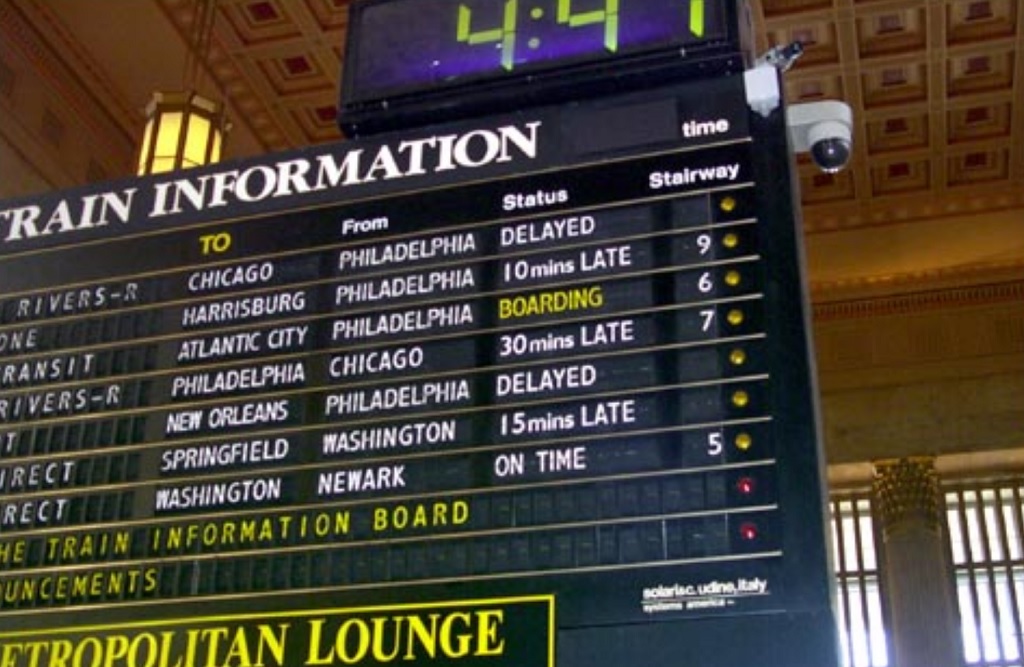
5:30 p.m, aboard the R1
Baran, a 22-year-old astrophysics student from Krefeld, Germany, is riding to the airport, determined to get information on her canceled flight home. She arrived in Philadelphia early this morning from a Star Trek convention in Las Vegas, before the tragedy in New York, and has spent the day walking around downtown.
“I went to your Independence Hall and Liberty Bell, but they were closed,” the young woman says in her heavily accented English. “I watched the television pictures from New York and cried. How can somebody do that? So many people lost their lives. So many mothers and fathers and daughters and sons.” Even now, Baran’s eyes fill with tears as she speaks.
As the train pulls into the station for airport terminal A, a passenger mentions to Baran that she’ll have quite a story to tell when she gets home to Germany.
“This is not a story to tell,” she says soberly. “This is a story to cry about.”
5:30 p.m., 30th Street Station
Amtrak has resumed service along the Northeast corridor. Still, not many people are waiting for trains compared to a typical weekday evening. Outside, a handful of police officers continue to stand guard.
A voice floats across the station over the PA system.
“Effective Sept. 11, Amtrak will honor all commuter train and airline tickets.”
Pamela Landman and Monica Brenner have no idea what to expect when they step out of the train at Penn Station in New York.
The two women, recruiters for the law firm Cadwalader, Wickersham & Taft, fortuitously had chosen today to chat up Penn Law students. Some of their fellow colleagues arranged for a car back to Westchester when the recruiting was canceled this morning, but Landman and Brenner realized they wouldn’t be able to get into Manhattan, where they both live. Their office is just a few blocks away from where the World Trade Center used to stand.
“I’ve gotten a lot of voicemail messages from friends and family members checking on me because they didn’t realize I was out of town,” Brenner says.
One of the other firms doing recruiting on Penn’s campus is headquartered in the World Trade Center, Landman says.
“They were trying to get through all day. Can you imagine?” she asks.
Landman says she spoke to some of her own colleagues in New York earlier in the day and couldn’t describe the astonishment in their voices.
“No one has ever experienced anything like this,” she says. “People kept describing it as a movie because nothing in real life is comparable.… It was a good day for us not to be in New York.”
Hearing about the scene in Manhattan almost seems surreal, Brenner adds. “You can’t believe the streets you walk down every day could be destroyed. The World Trade Center is such a constant in our lives — whenever you’re lost, you just look up at them [to get orientated].”
Brenner and Landman agree that they will certainly learn about friends injured, and even killed, over the next few days.
“All of the people who work in the World Trade Center are our peers,” Brenner says. And during a phone conversation with her mom this morning, Brenner had found out that an acquaintance was on one of the planes hijacked from Boston.
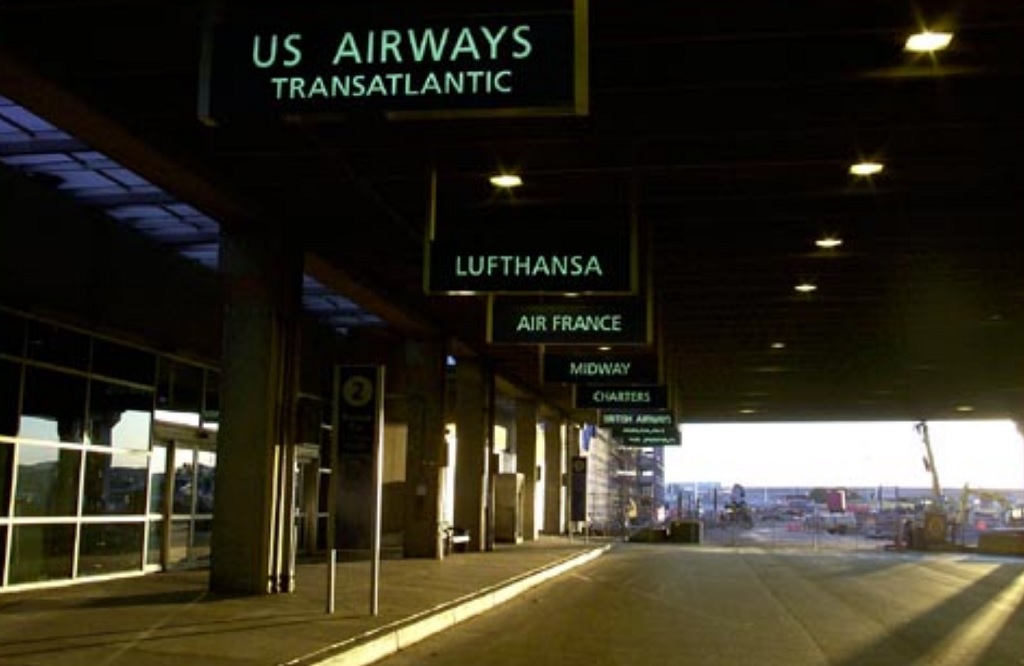
6 p.m., Philadelphia International Airport
Philly International is a ghost town. There are no travelers in baggage claim, no ticket-takers, no information booths, no passengers sleeping in the terminals, no line of taxicabs outside. Save for security personnel and city police, not a soul is seen. The quiet is surreal and unsettling.
“I’ve seen the airport shut down before, but I’ve never seen anything like this,” one security officer says, requesting that his name not be used. “This whole day has been like something you see in an action movie — like Die Hard or something. I just want to go home and hug my family.”
6 p.m., Al-Aqsa Islamic Society Mosque, Germantown Avenue
Two police officers stand across the street from the mosque, one of the largest in the city. The officers won’t say why they are there.
The main doors to the Mosque open to reveal the dim foyer that leads inside to the worshipping place. In the fading light, a man moves quickly forward across the expansive carpet and warns the reporter not to come forward because no shoes are permitted.
His name is Nibil. He is fine, he says, but refers all questions to a man named Marwan.
Later, Marwan Kreidie, an American Muslim active in the community and a member of the mosque, will explain: “I met with the head of the Human Relations Commission this morning. I have also requested extra police at all the Arab mosques [in Philadelphia]. We had a prayer service today for the dead. We as a community are appalled and revolted by the attacks against our country. We are planning a blood drive at our mosque. The police have been very cooperative. We have also asked them to look out for the Lebanese-Christian community in South Philadelphia.”
6 p.m., Rittenhouse Square
With the sun still peeking out, children jumping on the goat, hippies playing hacky sack, musicians strumming on guitars and couples kissing, the Square looks like its typical idyllic self. But when you listen closely, you hear the unmistakable shock in people’s voices.
A man wearing a houndstooth jacket and black jeans looks like he is on his way home from work. He has stopped to talk with two friends seated on the edge of the fountain.
“It is so weird not to see any planes in the sky,” he comments.
One of the others speculates that today’s tragedy is “just the beginning.”
“No place is safe,” he says. “I think what shook a lot of people was what happened to the Pentagon, the center of our military.”
Someone else notes that most restaurants in Philadelphia are closed.
“I’m not even hungry,” his friend responds. “I feel nauseous.”
On a bench near the Locust Street side of the park, a debate is in full swing. One participant argues that today’s attack is tied to the recent UN Conference on Racism.
“No one likes the United States or Israel,” he says. “They’re jealous of our freedom and wealth.”
He blows off every comment the other guys make and takes a harsh stance against terrorists.
“We have this problem because when people hijacked planes before, the U.S. let it go,” he says. “And Iraq was a half-assed job, too.”
6:53 p.m., City Hall
The mayor is minutes away from holding a press conference. At the Northeast entrance, four or five cops are gathered. “The media can’t go in,” one says testily.
“Then how is it a press conference?” a reporter asks.
“Channel 6 has got it,” he replies.
7 p.m., Old Pine Presbyterian Church, Fourth and Pine streets
An emotional Rev. Deborah McKinley is telling the 100 or so congregants who have gathered for a prayer service that “the world has forever changed.”
“The earth underneath us has shaken,” she says, asking God to bring “hope” and “clarity” to the future.
Since the purpose of the service is to “find comfort and strength” in one another, McKinley asks congregants to share their feelings.
The first woman to rise says, “I’d like to pray for the parents who lost children and the children who lost parents.”
The next woman to stand up says she was in Germany during World War II and lived through the constant bombings. “Most people are inherently good and certainly God is good,” she says. “It just makes me wonder why the innocent must suffer.”
From the back of the sanctuary a woman says she spent much of the morning worrying about her husband, a pilot for US Airways. “He was in the air at the time of the tragedy, but he’s okay.”
A man sitting with his wife and two children is visibly shaken when he speaks next. “My brother works at Morgan Stanley in New York. He lost colleagues and friends and he is devastated,” he says. “My heart goes out to the doctors, firefighters, police and other rescue workers who died helping people when the buildings collapsed.”
A man sitting a few pews up says he was working in Manhattan today and just recently arrived back in Philadelphia. “Several of my clients were on the plane traveling from Boston to L.A.… In New York, people were walking along the streets aimlessly, they felt helpless. We were expected not to leave our office.… Friends offered me sanctuary in their apartments if I couldn’t get back. Although the trains were running southbound, when we got to the Holland Tunnel and I looked back, it was amazing to see that the World Trade Center was no longer standing.”
After a pause, a woman sitting close to the front declares, “I hope everyone keeps a cool head and that no one goes for a knee-jerk reaction of revenge.”
A few aisles away, a fellow congregant stands up. “I ask that we remember those who are dancing in the street with delight to watch the symbols of economic power and wealth be destroyed.”
A young woman speaks up next to share her “surreal” day. An actress, she spent the day rehearsing a play — alongside another actress whose best friend began her first day at a temp job in the World Trade Center this morning. “My colleague spent the entire day attempting to call her. It was very hard watching this girl trying to make it through the day and not knowing if her friend was okay.”
When no one else speaks up, McKinley addresses the congregation again. Wiping away tears, she says we will never understand why a tragedy like today’s act of terrorism happens.
“If the music has not stopped,” she says, “it is strangely out of tune.”
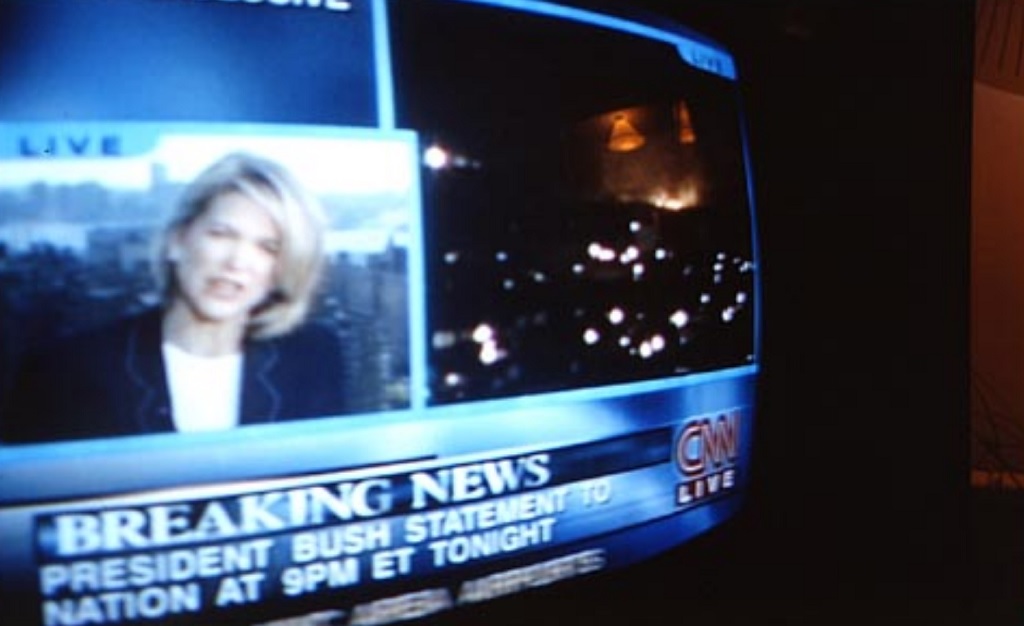
7:50 p.m., Red Cross building, Seventh and Spring Garden
The scene here is chaos with a happy face, or maybe it’s a stiff upper lip. People are in this large, open, hospital-lit room, having blood drawn. It has all the bustle of triage but there are smiles and jokes between the people in exam chairs and their caretakers. There are small tables in one corner of the room, with bags of chips or pretzels and refreshments for donors. Some people are waiting to be taken, holding medical history forms; they are ushered to another room for questions that involve more privacy and the pushing of buttons. They have been here for several hours; since earlier in the day the Red Cross has been turning people away. Volunteer Mary Towndrow is suggesting that people coming in now come back in a few days — the need for blood is great but there is a bottleneck of donors tonight, and no doubt there will be tomorrow.
A medical student comes in off the street and tells her, “I’m ready to work.” Towndrow directs him to a coordinator. “Everyone wants to help,” she says. Towndrow, who is a consultant for PECO here four days each week, actually lives in Niagara-On-The-Lake in Canada. She showed up after her office closed, determined to give blood, and was told to come back. “I said, ‘Put me to work doing something.’” She is now wearing a “Blood Donor” T-shirt, directing the public and handing out medical history forms.
Her log is heartening and somewhat eerie. It shows that from 10 a.m. to 11 a.m., before news really hit, one person gave blood. The next hour, it was 16. By the time 6:30 to 7:30 p.m. rolled around, it was 31. These were the people the Red Cross could take — and by that time there were hundreds more ready and willing to donate.
9 p.m.
Eihab El-Azazy returns a call. “So far nothing has happened to me,” says the Islamic scholar who worships at the Al-Aqsa Islamic Society mosque in Germantown. “But I am afraid to out, and I am afraid for my wife, who wears a veil.” They are expecting their first child soon. “I don’t want her to go out.”
El-Azazy has his own ideas about the tragedy.
“I don’t think it was bin Laden,” says El-Azazy. “He could be dead by now and someone else is using his name. All those pictures of him are old. That attack was too high-tech for Islamic fundamentalists. This is not an Islamic group; those people misunderstand the Muslim religion and the Koran. In Egypt a commercial pilot makes $40,000 a year. He is like a prince there. Why would he want to give up everything for bin Laden?
“In the Middle East some Muslims are still fighting the Jews. They don’t understand that the Koran said in 600 A.D. to fight only three tribes of Israel. And the Koran meant then, not now; there should be no fighting now.
“The Muslim thought of suicide making you closer to God is not true; if you commit suicide, you go to hell. If you are at war, you can commit suicide for your country.
“But Islam must be the one to declare war, and that has not happened. The Middle East is not at war with the United States. All the Muslims I have talked to today are sad about what happened. If it was bin Laden he should he destroyed.”
9:30 p.m., South Street Diner, 140 South St.
Seated in a booth, diners Darien and Ariane express dissatisfaction with President Bush’s 8:30 speech. “He said it didn’t touch the fabric of America,” says Darien. “They hit these landmarks. If that’s not the fabric of America, what is?”
9:41 p.m., Mako’s, 301 South St.
CNN plays on three TVs in Mako’s. A customer named Israel says, “I don’t know who did it, but I hope we get them.” His friend Grover counters, “I hope they get the right people.”
10:41 p.m., Dirty Frank’s, 13th and Pine streets
Three friends, Jay, Matthew and Andrew, discuss their theories on the attacks over beers at the Washington Square West bar. Jay thinks the government shot down the plane that crashed near Pittsburgh when it was learned that it might be headed for Camp David.
Allen, a bouncer at Dirty Frank’s, suggests that America “nuke the Middle East.”
“I’m a big believer in genocide,” he says. “Wipe out their whole race.”
11:30 p.m., Washington, D.C.
In Rosslyn, Va., this morning, shortly after 10 a.m., a State Department foreign service officer and part-time Philadelphian was in a language-training class for his next country assignment. Upon hearing news of the World Trade Center attacks, the class flipped on the TV news; they watched live footage of the south tower collapsing in New York. The new coverage cut to D.C., and they learned of the Pentagon attack.
A little more than 12 hours later, the State Department officer drove to his home in the District. “The city’s not on lockdown anymore,” he says now, from home. “It’s just extremely empty. Very few people on the road. Very, very quiet. One police car, no military vehicles. Hardly a soul on the road — dramatically empty. No roadblocks.”
In between, the officer was thwarted by traffic and holed up at a friend’s house in Virginia, keeping up with news. By phone, the former Rendell administration employee has a chance to reflect on what just happened.
“By the time I turned the TV on, they were showing footage of the first building collapse,” he recalls. “Then I saw the Pentagon on fire, and I’m thinking, ‘What the hell’s going on?’”
And “of course,” he says, “there’s a million and one rumors about what’s possibly going on at that point.”
He hasn’t gone to the Department “since it all went down,” but has talked to co-workers about what exactly is going on, and how they feel about it. “There’s a lot of anger, a lot of concern about what’s coming in the future.… There’s a lot of anxiety toward the investigation, the ramifications of pointing a finger — ‘Are we gonna …’ — and what comes after that.
“You never know what’s gonna happen. When you have something like this, a multiple-event thing, you wonder if there’s more to come.”
But he’s not optimistic. “It’s gonna get scarier, too. Literally, you could have stuff happen tomorrow.”
It’s not the first time he’s felt that kind of uncertainty.
“When the two embassies blew up in Africa, I was sitting in an embassy … and you’re just thinking, ‘Is another one going up?’ You wonder when those things are gonna happen. You never expect it; when it does happen, all bets are off. Just seeing that plane going into the building — that’s something you never think about.
“When you think about terrorist attacks, I’ve never thought, ‘Well, someone’s gonna hijack a plane and fly into a building.’ These things happen at another level. The reality that takes place is at a level that normal people wouldn’t conceive of. When the [USS] Cole blew up, that was in the realm of what would be a normal terrorist attack — it’s a military target.”
The officer says he left Rosslyn, and tried to go to a friend’s house near the Pentagon, but the “traffic was horrific.” Besides the trail of cars, he was able to see the trails of “smoke, the jets flying over, the helicopters flying over. They scrambled some jets early on — there were rumors that there were more planes that were hijacked that were en route…”
Beyond state concerns and misinformation in general, which affect everybody, the officer says that misdirected public perception could affect American Muslim communities. “I think there will be some [discrimination],” he says. “Remember back when Oklahoma City happened? I was in Philadelphia then,” says the officer, who currently splits his time between the two cities. “In Overbrook there were fights breaking out in school. The instant assumption, that very day, was that it was foreign Islamic extremists responsible,” he says of the federal building bombing, for which a white American, Timothy McVeigh, was convicted and executed. “In school, fistfights were breaking out between practicing Muslim students and non-Muslim students. That’s an example of the perceptions; that’s teenagers, not adults, but those [incidents] are from perception.”
The State Department officer is relieved that one of his childhood friends who works in New York is safe. Earlier tonight he learned from another friend that the New Yorker had just stepped off the ferry — “about 15 blocks from the World Trade Center” — just as the second plane hit the Twin Towers. He’s relieved, but he’s also in as much disbelief as he is angry and uncertain. “Especially with a city like New York, where almost everyone around here knows loads of people there, a few people removed, everybody’s gonna know somebody that’s been affected by this. Who knows where the numbers are gonna end up?
He says that President Bush’s tone during his address to the nation reflected how much today’s events were “one of the greatest American tragedies.” But of all the words of comfort and unity and perseverance that Bush tried to invoke in his speech, the officer notes “the piece about not differentiating between the terrorists and the countries that harbor them, even if it wasn’t super forceful, it was what’s needed.”
Wednesday, September 12, 2001
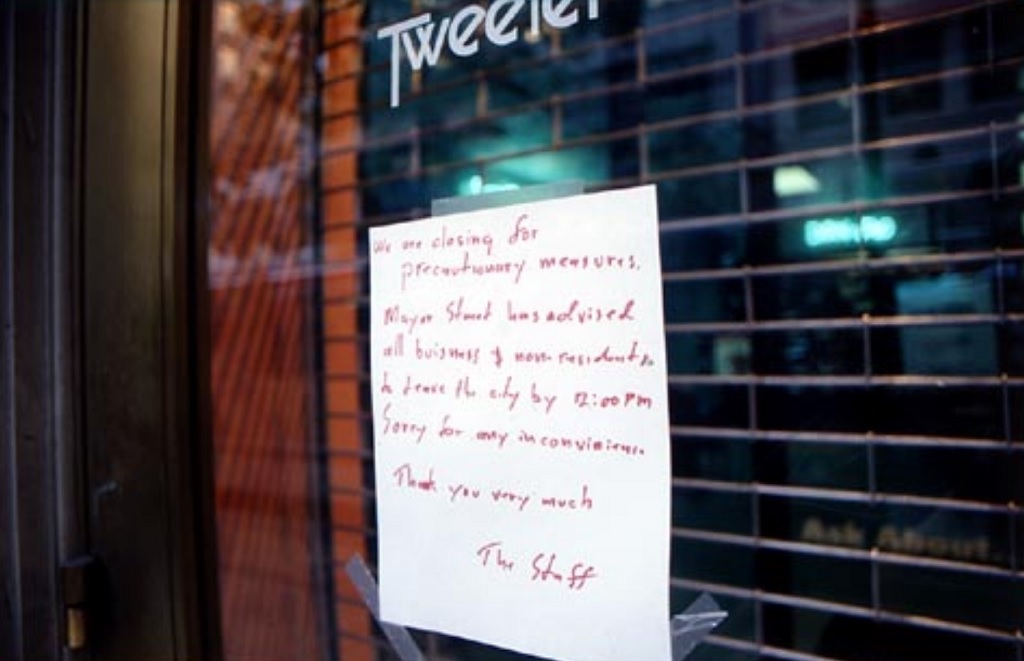
9:45 a.m., Old City
Local novelty vendor and newspaper deliveryman James “Jimmy Pretzel” Pasquarella says that an hour ago he witnessed the beatdown of two Middle Eastern cab drivers on 34th Street in University City.
“I saw these two guys in turbans getting the crap kicked out of them by six or seven yuppie college kids,” Pasquarella says. “About 10 university cops were just handcuffing the kids when I stopped. I saw the cab with the door open and the kids were still cursing at the guys in the turbans lying on the ground.”
University of Pennsylvania Police Detective Sgt. Frank DeMeo says that Jimmy Pretzel has his facts twisted.
“You guys must have gotten some bad information,” DeMeo insists. “I just checked, and that didn’t happen. Nothing like that happened this morning.”
Pasquarella says the taxi was black and white, but he doesn’t remember the name of the cab company. Yet he’s absolutely positive that the kids involved were detained by Penn Police.
“I saw a campus police car, not a Philly police car,” he maintains. “I probably wouldn’t have taken much notice at all, but some guys in the 7-Eleven were just talking about a similar incident yesterday. I understand why they’d want to cover something like this up, though. Nobody wants to see innocent people get hurt for something they didn’t do, and I’ll bet this kind of thing is happening all over the country today. It’s a real shame.”
10:11 a.m.
The American Jewish Congress faxes a statement: “Afghanistan, Iran, Iraq, Syria and Libya have proudly defended the political uses of terrorism. Any country that has excused, justified or given shelter to terrorists must share the blame for what happened today.”
About an hour later, Murray Friedman, director of the Middle Atlantic Regional office of the American Jewish Committee, calls for “an all-out war against terrorism” using assassinations rather than “an ACLU way of approaching these things.
“In the past,” he says, “traditional Israeli methods of dealing with terrorism were often dismissed in the U.S. as too harsh. We may have to move closer to the Israeli methods.”


